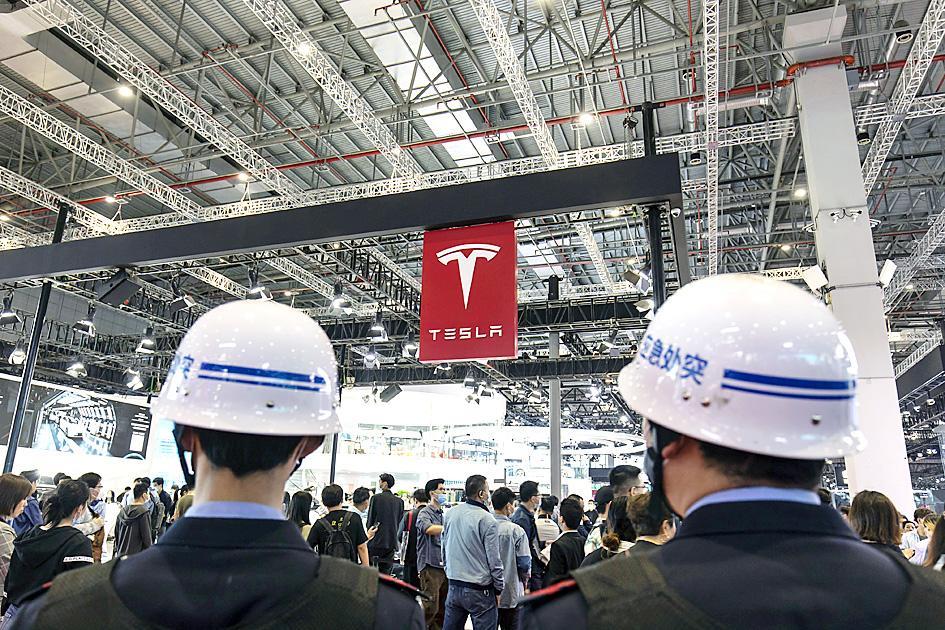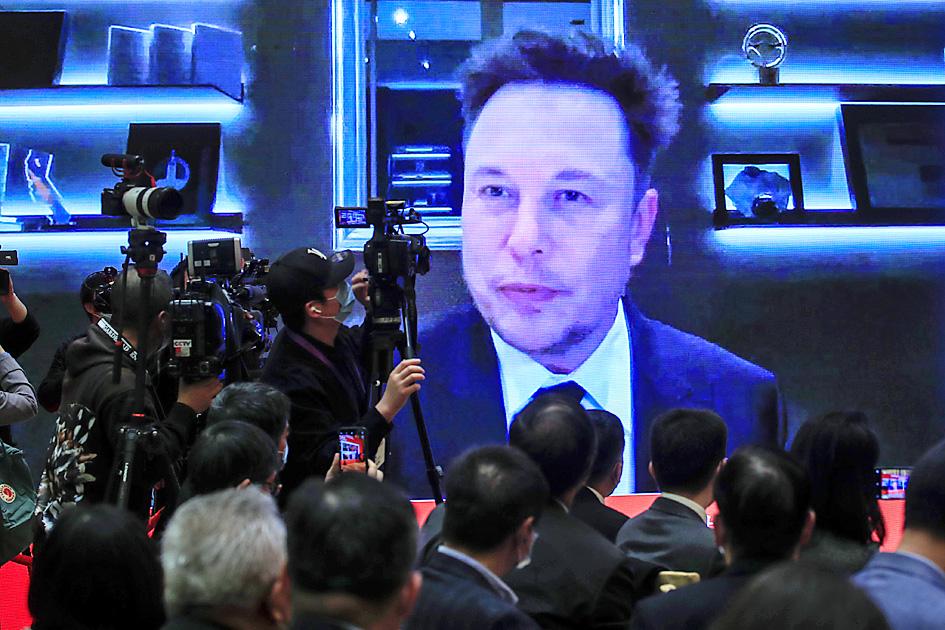Electric vehicle maker Tesla Inc, facing scrutiny in China over safety and customer service complaints, is boosting its engagement with regulators and beefing up its government relations team, industry sources said.
Tesla’s change of strategy leading to more behind-the-scenes interaction with policymakers in Beijing compared with relatively little previously shows the seriousness with which the US automaker views the setbacks in its second-biggest market.
TALKING SHOP

Photo: Bloomberg
It also comes at a time when China is trying to regulate large and powerful private companies, especially in the technology sector, on concerns about their market dominance.
As they do elsewhere, regulators in China, the world’s biggest auto market, discuss industry policies and standards with global and local companies, industry associations and think tanks.
In the past few weeks, Tesla executives attended at least four policy discussions, on topics including auto data storage, vehicle-to-infrastructure communication technologies, vehicle recycling and carbon emissions, the people said.

Photo: EPA-EFE
California-based Tesla, which makes electric Model 3 sedans and Model Y sport utility vehicles at its own plant in Shanghai, did not make major commitments at the meetings, but participated in some discussions, they said.
SEEKING HARMONY
Tesla is also expanding its government relationship team in China, one of the sources said.
According to two recruitment advertisements last month on its WeChat account, Tesla is hiring managers to update a policy database and maintain relationships with government and industry associations to “build a harmonious external environment to support Tesla’s business development in the regional market.”
Accounting for roughly 30 percent of Tesla’s global sales, China is the automaker’s second-biggest market after the US and helped it post record first-quarter vehicle deliveries.
PRESSURE MOUNTS
Pressure has been building over the past few months on Tesla’s mostly excellent relations with Beijing.
In February, Chinese regulators summoned it over consumer reports of battery fires, unexpected acceleration and failures in over-the-air software updates.
In March, Tesla came under scrutiny when the military banned its vehicles from entering its complexes, citing security concerns over cameras, sources said.
Days later, chief executive Elon Musk appeared by video at a high-level forum, saying that if Tesla used vehicles to spy in China or anywhere, it would be shut down.
Last month, Tesla was targeted by state media and regulators after a customer, angry over the handling of her complaint about malfunctioning brakes, climbed on top of a Tesla vehicle in protest at the Shanghai auto show. Videos of the incident went viral.
Grace Tao (陶琳), a Tesla vice president who heads its government relations effort in China, was criticized in state media last month after she was quoted in a media interview questioning whether the aggrieved customer was acting on her own.
In response to the complaints, Tesla said it would set up a China data center, launch self-inspection to improve services and work with regulators.

MULTIFACETED: A task force has analyzed possible scenarios and created responses to assist domestic industries in dealing with US tariffs, the economics minister said The Executive Yuan is tomorrow to announce countermeasures to US President Donald Trump’s planned reciprocal tariffs, although the details of the plan would not be made public until Monday next week, Minister of Economic Affairs J.W. Kuo (郭智輝) said yesterday. The Cabinet established an economic and trade task force in November last year to deal with US trade and tariff related issues, Kuo told reporters outside the legislature in Taipei. The task force has been analyzing and evaluating all kinds of scenarios to identify suitable responses and determine how best to assist domestic industries in managing the effects of Trump’s tariffs, he

TIGHT-LIPPED: UMC said it had no merger plans at the moment, after Nikkei Asia reported that the firm and GlobalFoundries were considering restarting merger talks United Microelectronics Corp (UMC, 聯電), the world’s No. 4 contract chipmaker, yesterday launched a new US$5 billion 12-inch chip factory in Singapore as part of its latest effort to diversify its manufacturing footprint amid growing geopolitical risks. The new factory, adjacent to UMC’s existing Singapore fab in the Pasir Res Wafer Fab Park, is scheduled to enter volume production next year, utilizing mature 22-nanometer and 28-nanometer process technologies, UMC said in a statement. The company plans to invest US$5 billion during the first phase of the new fab, which would have an installed capacity of 30,000 12-inch wafers per month, it said. The

Taiwan’s official purchasing managers’ index (PMI) last month rose 0.2 percentage points to 54.2, in a second consecutive month of expansion, thanks to front-loading demand intended to avoid potential US tariff hikes, the Chung-Hua Institution for Economic Research (CIER, 中華經濟研究院) said yesterday. While short-term demand appeared robust, uncertainties rose due to US President Donald Trump’s unpredictable trade policy, CIER president Lien Hsien-ming (連賢明) told a news conference in Taipei. Taiwan’s economy this year would be characterized by high-level fluctuations and the volatility would be wilder than most expect, Lien said Demand for electronics, particularly semiconductors, continues to benefit from US technology giants’ effort

‘SWASTICAR’: Tesla CEO Elon Musk’s close association with Donald Trump has prompted opponents to brand him a ‘Nazi’ and resulted in a dramatic drop in sales Demonstrators descended on Tesla Inc dealerships across the US, and in Europe and Canada on Saturday to protest company chief Elon Musk, who has amassed extraordinary power as a top adviser to US President Donald Trump. Waving signs with messages such as “Musk is stealing our money” and “Reclaim our country,” the protests largely took place peacefully following fiery episodes of vandalism on Tesla vehicles, dealerships and other facilities in recent weeks that US officials have denounced as terrorism. Hundreds rallied on Saturday outside the Tesla dealership in Manhattan. Some blasted Musk, the world’s richest man, while others demanded the shuttering of his